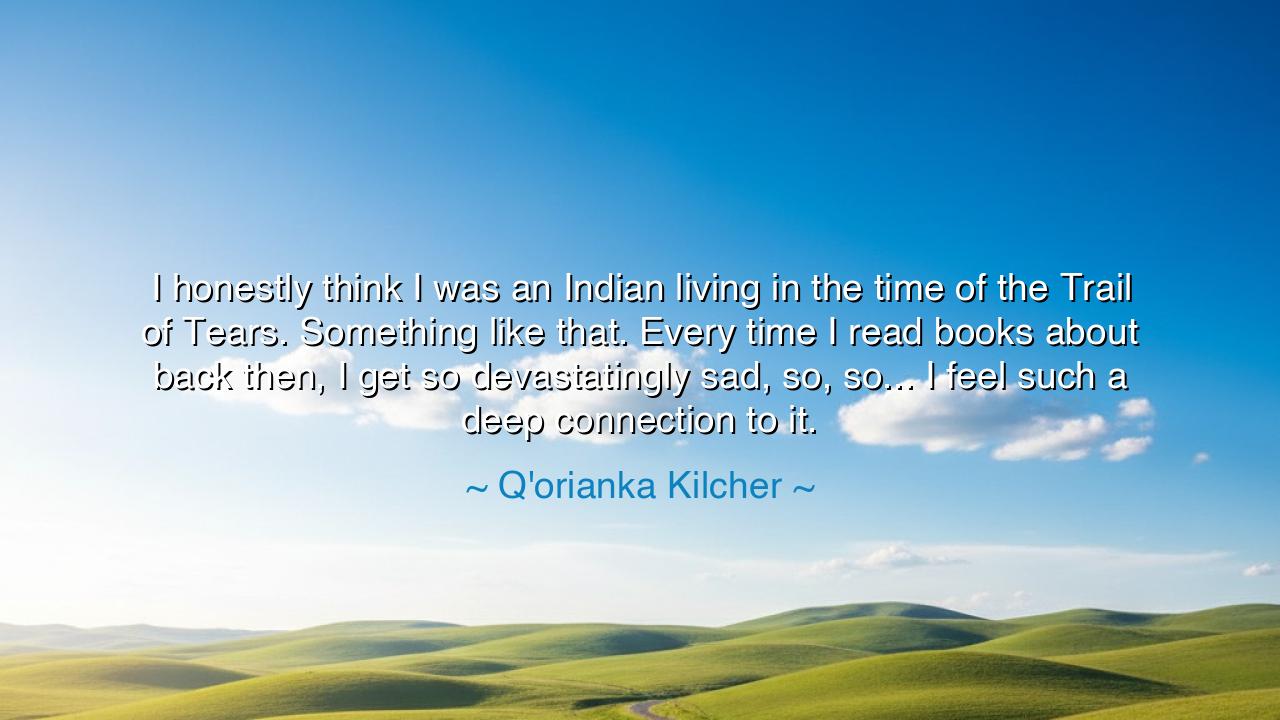
I honestly think I was an Indian living in the time of the Trail
I honestly think I was an Indian living in the time of the Trail of Tears. Something like that. Every time I read books about back then, I get so devastatingly sad, so, so... I feel such a deep connection to it.






When Q’orianka Kilcher said, “I honestly think I was an Indian living in the time of the Trail of Tears. Something like that. Every time I read books about back then, I get so devastatingly sad, so, so… I feel such a deep connection to it,” she was speaking from a place where memory and spirit intertwine—a realm the ancients knew well, where the soul remembers what history has tried to forget. Her words are not those of mere sentiment; they echo a recognition that transcends time, the recognition that sorrow leaves echoes, and those echoes call out to hearts still open enough to hear them. Kilcher’s reflection is a testament to ancestral empathy, the mysterious bond between the living and the dead, between the hearts of today and the wounds of yesterday.
The Trail of Tears was one of the darkest passages in American history—a forced march that displaced entire nations of Indigenous people from their ancestral lands in the 1830s. Thousands perished from hunger, disease, and exposure, their tears mingling with the rain-soaked earth as they walked toward an unknown horizon. To read of it, to imagine it, is to feel the weight of grief not only for the lives lost but for the silencing of entire worlds—cultures, songs, and languages scattered like ashes across a continent. When Kilcher says she feels “devastatingly sad,” she is expressing not a distant sympathy but a spiritual remembrance—as though the souls who once walked that sorrowful path still whisper to her through the pages of history.
This feeling of connection to the past has long been described by philosophers and mystics. The ancient Greeks believed in anamnesis, the idea that the soul carries memories from previous lives. The poet Rumi wrote that “the wound is the place where the light enters you,” meaning that through our sensitivity to suffering—ours or others’—we awaken to the shared soul of humanity. Kilcher’s sadness, then, is not weakness but awareness. It is the echo of an old truth: that the pain of the world does not vanish; it changes form, waiting for someone to feel it again, to remember it, and to give it voice.
In this way, Kilcher’s connection to the Trail of Tears mirrors a universal truth about art and empathy. She is not only remembering history—she is embodying it. As an actress and storyteller, her calling is to resurrect emotion, to bring buried truths to light so that others may see. The ancients had a word for such people: keepers of the flame—those who carry forward the memory of what must not be forgotten. Her emotional response to the suffering of Indigenous people is not detached observation; it is the continuation of their story through her, a living bridge between eras. It is as if the ancestors chose her heart as a vessel through which remembrance might live again.
There are echoes of this sacred empathy throughout history. When Harriet Beecher Stowe wrote Uncle Tom’s Cabin, her tears fell onto the pages that would stir the conscience of a nation against slavery. When Frida Kahlo painted her pain, she turned her suffering into symbols that spoke across centuries of human endurance. Likewise, Q’orianka Kilcher’s recognition of sorrow is not a burden to hide, but a call to bear witness—to honor the pain of others not by drowning in it, but by transforming it into awareness, compassion, and action. This is how sorrow becomes wisdom and grief becomes strength.
The meaning of Kilcher’s quote, then, is both deeply personal and profoundly collective. It teaches us that history is not dead—it breathes through us. The suffering of those who came before us calls for acknowledgment, not silence. The tears of the Trail still fall, and when someone like Kilcher feels them, she is participating in the sacred act of remembrance that heals both past and present. Her sadness is holy—it is the heart’s refusal to become numb, the spirit’s insistence that love and justice are timeless.
Let this be the lesson passed down: do not turn away from the sadness of history. Let it touch you. Let it humble you. To feel deeply for what has been lost is to be fully alive, and to remember is to resist the erasure of truth. When you encounter suffering—whether in the pages of a book or in the world around you—listen to it as Kilcher did. Let it awaken empathy, courage, and purpose. For in feeling another’s pain, you honor their humanity—and in doing so, you reaffirm your own. The ancients would call this the highest form of wisdom: to let sorrow refine the soul into compassion, and to carry forward the memory of the fallen not as grief alone, but as the living promise that their tears were not shed in vain.






AAdministratorAdministrator
Welcome, honored guests. Please leave a comment, we will respond soon